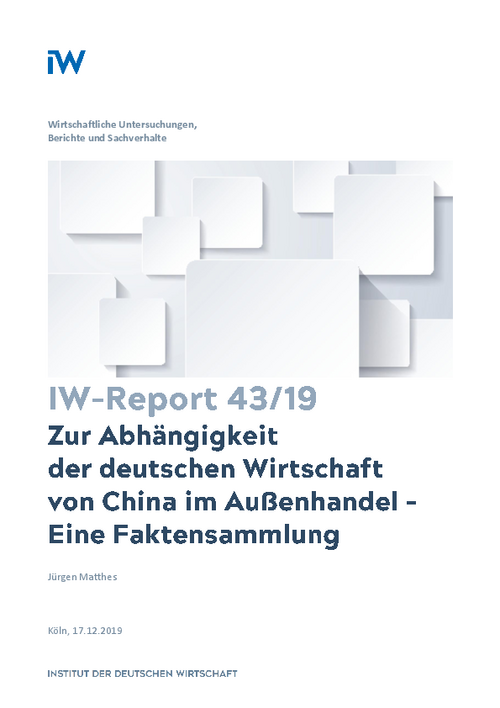In the debate on whether Germany should position itself more robustly vis-à-vis China, it is sometimes pointed out that the German economy and above all individual German DAX companies are heavily dependent on China. Against this background, this report analyses the economic dependence of Germany (as a production location) on China in foreign trade.

The German Economy's Dependence on China for Foreign Trade - A Collection of Facts
IW-Report

In the debate on whether Germany should position itself more robustly vis-à-vis China, it is sometimes pointed out that the German economy and above all individual German DAX companies are heavily dependent on China. Against this background, this report analyses the economic dependence of Germany (as a production location) on China in foreign trade.
China has become Germany's most important trade and import partner in merchandise trade. With a merchandise export share of 7 per cent, China plays a more important role for Germany than for all other EU countries. The enormous increase in German merchandise exports to China between 1991 and 2018 contributed almost 27 percentage points to the total German merchandise export growth of just under 290 per cent, which corresponds to a share of almost one tenth of total export growth. Nevertheless, without China's contribution, annual German exports would have risen only slightly less (except in a few individual years). In addition, as the German export industry is highly diversified, it has many trading partners who continue to account for 93 per cent of exports.
The relevance of exports of goods and services to China for the German economy as a whole and for economic growth in Germany can be estimated using the OECD's TIVA database, which covers the period 2005 to 2015. After a strong increase since 2005, German value-added exports to China accounted for 2.8 per cent of Germany's total gross value added in 2015. Their growth contribution of 2.8 percentage points to the 33 per cent growth in Germany's nominal total gross value added between 2005 and 2015 is of the same order of magnitude. In a comparison among G6-countries, these figures are high relative to other European countries, and higher than in merchandise trade relative to the larger economies of the US and Japan. This applies above all to the German capital goods manufacturers (mechanical engineering and electrical equipment). Nevertheless, it should be noted that more than 97 per cent of total economic value added in Germany is not dependent on exports to China and that also without Germany’s exports to China nominal economic growth would have been only a little less at around 30 per cent. All in all, the dependence on China for exports therefore appears to be limited – and a glance at the high sales shares of some large German companies in China distorts the picture. This is also shown by a simplified calculation for the hypothetical case of a trade conflict with China at the end of the report.
Germany's dependence on China on the import side can also be analysed with the TIVA data. Between 2005 and 2015, the share of value-added originating from China in the total value added in German final consumption rose from 0.6 to 2 per cent. In comparison with other value-added suppliers, China is as important for Germany as the US, but much less important than the old EU states. In a G6 comparison, Germany is no more dependent on value-added from China than other European G6 countries and slightly less than the US and Japan. Overall, China's import relevance is therefore low. However, at sector level, this does not apply to the final consumption of the German electrical equipment industry. Nevertheless, the importance of Chinese inputs for the competitiveness of the German export industry is very limited, also in the electrical equipment industry.

Jürgen Matthes: Zur Abhängigkeit der deutschen Wirtschaft von China im Außenhandel – Eine Faktensammlung
IW-Report

More on the topic
![[Translate to English:] Das Gebäude des Weißen Hauses in Washington, D.C. in den Vereinigten Staaten von Amerika. [Translate to English:] Das Gebäude des Weißen Hauses in Washington, D.C. in den Vereinigten Staaten von Amerika.](/fileadmin/_processed_/c/1/csm_GettyImages-2161499385_White_House_Editorial_884306add8.jpg)
Trump or Harris or ...? What Europe must prepare for
A few months before the presidential election in the USA, Donald Trump has a good chance of being re-elected. On the Democratic side, the incumbent president has withdrawn his candidacy after a long period of hesitation, while Vice President Kamala Harris is ...
IW
Competitive pressure from China for German companies
A firm survey conducted in March/April 2024 as part of the IW-Zukunftspanel among around 900 German companies from the manufacturing and industrial services sectors shows that around 350 of the companies surveyed have Chinese competitors in their markets.
IW